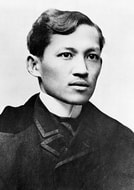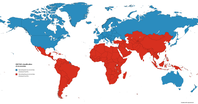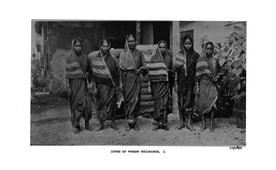November 2023
Decolonising Global History: new voices, new values, new methodologies
ANALYSING RACIAL THEORIES AND HIERARCHIES EXISTING AT THE TIME OF THE ASIA-PACIFIC WAR: JAPAN’S VIEW OF THE “SOUTH-SEA ISLANDS”

Wikicommons
Agnese Dionisio ([email protected])
This paper provides an analysis of the racial theories and conceptions prevailing in Japan during the Asia-Pacific War, a period spanning approximately 15 years from the Mukden Incident of 1931 until 1945, highlighting Japan’s imperialism in East Asia, Southeast Asia, and Oceania. The central theme explores how the Japanese Empire positioned itself in comparison to Western nations and other Asian peoples, leading to the creation of a racial hierarchy with the “Yamato race” at the pinnacle, while categorizing all other Asian ethnicities into different levels below. Particular emphasis is placed on the racial theories and hierarchies constructed around the region back then referred to as “South Sea Islands”, Nan’yō guntō. (Paper in English)
This paper provides an analysis of the racial theories and conceptions prevailing in Japan during the Asia-Pacific War, a period spanning approximately 15 years from the Mukden Incident of 1931 until 1945, highlighting Japan’s imperialism in East Asia, Southeast Asia, and Oceania. The central theme explores how the Japanese Empire positioned itself in comparison to Western nations and other Asian peoples, leading to the creation of a racial hierarchy with the “Yamato race” at the pinnacle, while categorizing all other Asian ethnicities into different levels below. Particular emphasis is placed on the racial theories and hierarchies constructed around the region back then referred to as “South Sea Islands”, Nan’yō guntō. (Paper in English)
«Los indios bravos»: El pensamiento decolonial- poscolonial de José Rizal

Wikicommons
Erwin Fernández Soriano ([email protected])
Until now, the postcolonial/decolonial thought of Jose Rizal (1861-1896), Philippine national hero, has not been studied within postcolonial/decolonial studies. Rizal, writer of two Philippine novels, polyglot, and the soul of the Philippine revolution according to the Spaniards, produced writings that could be studied and analyzed under postcolonial/decolonial optic. This article tries to point out the postcolonial/decolonial thought of Rizal, based on his written works, and place them for the first time within the postcolonial/decolonial ambit. In his essays and novels, he identified the effects of colonialism to the colonized, described colonialism as a social disease and mental pathology, marked cultural imperialism as an oppression and finally advocated education as response to colonialism. Thus, his works are contribution to postcolonial/decolonial thought that should be included in that area of studies.(Paper in Spanish)
Until now, the postcolonial/decolonial thought of Jose Rizal (1861-1896), Philippine national hero, has not been studied within postcolonial/decolonial studies. Rizal, writer of two Philippine novels, polyglot, and the soul of the Philippine revolution according to the Spaniards, produced writings that could be studied and analyzed under postcolonial/decolonial optic. This article tries to point out the postcolonial/decolonial thought of Rizal, based on his written works, and place them for the first time within the postcolonial/decolonial ambit. In his essays and novels, he identified the effects of colonialism to the colonized, described colonialism as a social disease and mental pathology, marked cultural imperialism as an oppression and finally advocated education as response to colonialism. Thus, his works are contribution to postcolonial/decolonial thought that should be included in that area of studies.(Paper in Spanish)
Can the University Speak?

Wikicommons
Nilay Barlas ([email protected])
The problematic nature of higher education and knowledge production has been a subject of debate within the academy. University students have protested against values that evoke colonial history and Western hegemony, as seen in the #RhodesMustFall protests in South Africa. This debate has highlighted the historically one-sided and interest-driven manner in which knowledge has been produced and disseminated, especially within the contemporary academy, where neoliberal practices are deeply intertwined. In this context, I provide a concise summary of these discussions while integrating the perspectives of two influential figures in postcolonial theory, Homi Bhabha and Gayatri Spivak. Homi Bhabha's 'Theory of Mimicry' offers a plausible explanation for the imitation of the Global North's university culture and structure by peripheral countries. It suggests that the privileged position of the West as a pioneer in this regard dates back to the colonial period when non-Western societies believed they could achieve a semblance of civilization by adopting these imitative practices. However, the current state of higher education is deeply flawed and biased due to this imitation of Western models by non-Western universities. This subordination of higher education to Western ideals has made it a tool of neoliberalism, which underscores that knowledge production, and consequently higher education, lacks its own agency and is rendered subaltern. Nevertheless, Latin America provides examples of subversity and pluriversity that challenge the conventional university model in the pursuit of decolonization.
(Paper in English)
The problematic nature of higher education and knowledge production has been a subject of debate within the academy. University students have protested against values that evoke colonial history and Western hegemony, as seen in the #RhodesMustFall protests in South Africa. This debate has highlighted the historically one-sided and interest-driven manner in which knowledge has been produced and disseminated, especially within the contemporary academy, where neoliberal practices are deeply intertwined. In this context, I provide a concise summary of these discussions while integrating the perspectives of two influential figures in postcolonial theory, Homi Bhabha and Gayatri Spivak. Homi Bhabha's 'Theory of Mimicry' offers a plausible explanation for the imitation of the Global North's university culture and structure by peripheral countries. It suggests that the privileged position of the West as a pioneer in this regard dates back to the colonial period when non-Western societies believed they could achieve a semblance of civilization by adopting these imitative practices. However, the current state of higher education is deeply flawed and biased due to this imitation of Western models by non-Western universities. This subordination of higher education to Western ideals has made it a tool of neoliberalism, which underscores that knowledge production, and consequently higher education, lacks its own agency and is rendered subaltern. Nevertheless, Latin America provides examples of subversity and pluriversity that challenge the conventional university model in the pursuit of decolonization.
(Paper in English)
State Construction and Representation of the African- Brazilian Identity in Colonial Lagos

ecured.cu
Temitope Fagunwa ([email protected])
The invasion of Lagos in 1851 and the eventual annexation of 1862 by the British colonial state witnessed the birth of the purported “legitimate commerce”. This era coincided with the repatriation of African ex-slaves from Brazil in consequence to the 1835 Bahia Revolt. Entrepreneurial skills of the African-Brazilian ex-slaves, in particular their expertise in agricultural activities drew them closer to the colonial state. Hoping to secure the active participation of the returnees in new forms of commerce, the British colonial state concocted narratives of “African Brazilian exceptionalism” by offering several incentives to the benefit of the returnees. However, decades before the close of the 19th century, the British colonial-invented concept of “African Brazilian exceptionalism” was put on trial. This paper intends to pursue two subject matters, first, the modus operandi, that was built on both myth and fact and employed by the British colonial state in institutionalizing “African-Brazilian exceptionalism”, and second the subsequent attempts employed by membres of the community in embracing their African social identity during the 20th century.
(Paper in English)
The invasion of Lagos in 1851 and the eventual annexation of 1862 by the British colonial state witnessed the birth of the purported “legitimate commerce”. This era coincided with the repatriation of African ex-slaves from Brazil in consequence to the 1835 Bahia Revolt. Entrepreneurial skills of the African-Brazilian ex-slaves, in particular their expertise in agricultural activities drew them closer to the colonial state. Hoping to secure the active participation of the returnees in new forms of commerce, the British colonial state concocted narratives of “African Brazilian exceptionalism” by offering several incentives to the benefit of the returnees. However, decades before the close of the 19th century, the British colonial-invented concept of “African Brazilian exceptionalism” was put on trial. This paper intends to pursue two subject matters, first, the modus operandi, that was built on both myth and fact and employed by the British colonial state in institutionalizing “African-Brazilian exceptionalism”, and second the subsequent attempts employed by membres of the community in embracing their African social identity during the 20th century.
(Paper in English)
Colonial Possession and Gendered Labor: An Analysis of Women’s Role in the Bombay Cotton Textile Mills in the Late Nineteenth Century

Palak Vashist ([email protected])
This paper critically examines the conditions of women workers in the textile mills of Bombay during the late nineteenth century. The analysis is conducted through the lens of 'possession' by the colonial State and its policies of labor regulation. The concept of 'possession' is explored at two levels. First, it is argued that women's vulnerability in the colonial narrative served as the foundation for the arbitrary ‘protection’ policies devised by colonial authorities in the form of factory legislation. Second, it is highlighted that factory legislation established colonial control over women's gendered roles, categorizing them as 'unskilled' labor. The introduction of the Indian Factory Act of 1891 further restricted women's mobility within the factory space and regulated their working patterns, including working hours and days, ultimately leading to a higher unemployment rate among women workers. Furthermore, the Act justified irregular and underpaid wages for women. This paper highlights that the factory legislation, intended to protect women from their vulnerable position made them more vulnerable resulting in their unemployment. This examination of the gendered nature of the Bombay mills aims to trace the global postcolonial history of wage gaps and gender distinctions at work back to their colonial origins. Overall, this study contributes to our understanding of how colonial policies have had a lasting impact on labor practices and gender relations in postcolonial societies.
(Paper in English)
This paper critically examines the conditions of women workers in the textile mills of Bombay during the late nineteenth century. The analysis is conducted through the lens of 'possession' by the colonial State and its policies of labor regulation. The concept of 'possession' is explored at two levels. First, it is argued that women's vulnerability in the colonial narrative served as the foundation for the arbitrary ‘protection’ policies devised by colonial authorities in the form of factory legislation. Second, it is highlighted that factory legislation established colonial control over women's gendered roles, categorizing them as 'unskilled' labor. The introduction of the Indian Factory Act of 1891 further restricted women's mobility within the factory space and regulated their working patterns, including working hours and days, ultimately leading to a higher unemployment rate among women workers. Furthermore, the Act justified irregular and underpaid wages for women. This paper highlights that the factory legislation, intended to protect women from their vulnerable position made them more vulnerable resulting in their unemployment. This examination of the gendered nature of the Bombay mills aims to trace the global postcolonial history of wage gaps and gender distinctions at work back to their colonial origins. Overall, this study contributes to our understanding of how colonial policies have had a lasting impact on labor practices and gender relations in postcolonial societies.
(Paper in English)
Reviews
Erlenbusch-Anderson, Verena. Genealogies of Terrorism: Revolution, State Violence, Empire. Columbia University Press, 2018. Reviewed by Carlota Bloch Varela
Pamplona Molina, Gerard. El passat fosc del turó. El camp de concentració franquista del Castell de Lleida. Pagès editors, 2022. Reviewed by Gerard Llorens Decesaris
Martínez Andrade, Luis. Teoría Crítica Anticolonial. Ensayos de historia intelectual. Tirant Humanidades, 2023. Reviewed by Carla Andrés Bauzá.
Taibo, Carlos. En la estela de la guerra de Ucrania. Una glosa impertinente. Catarata, 2022. Reviewed by Carles Caballero.

